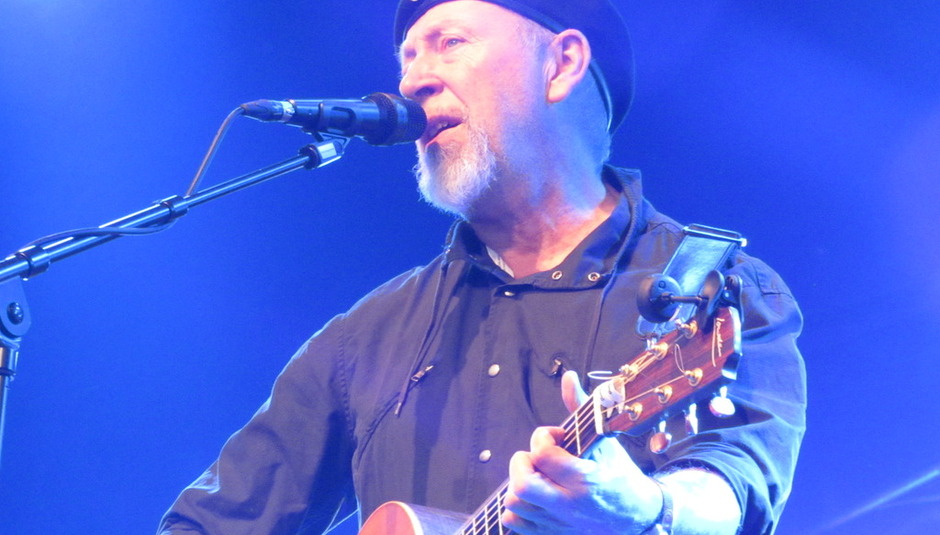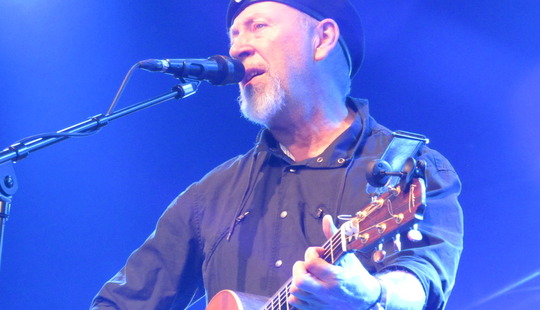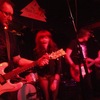Earlier this month, DiS spent half an hour in the company of a true folk legend. Having first started out with Fairport Convention in 1967, Richard Thompson has since gone on to become a distinguished guitarist, songwriter and performer in his own right. After leaving Fairport four years later, he released his first solo album Henry The Human Fly the following year. Soon after, he married singer Linda Peters and they went onto record six albums together culminating in 1982's Shoot Out The Lights, still regarded by some critics as his finest collection of songs to date.
In 2013, Thompson released his thirteenth studio album Electric, while last month (July) he put out Acoustic Classics, fourteen of his best known songs reinterpreted in acoustic form. He was awarded an OBE three years ago for his services to music, and is currently finishing off a collaborative album with several members of the Thompson family including ex-wife Linda.
Later this evening he'll play a career-spanning set to a captive audience at Cambridge Folk Festival. Beforehand, he'll talk to DiS about the current folk scene, life as a touring musician, the Guitar Camp he set up in Woodstock 3 years ago, his passion for cricket and Chelsea Football Club, and the Islamic faith he converted to in 1974.
DiS: You've played Cambridge Folk Festival on numerous occasions over the years. Is it one of those events you always look forward to?
Richard Thompson: Absolutely. It's a great festival. It's been around for fifty years. I think it's a measure of what a folk festival should be. I always see friends that I don't get to see that often and get to check out lots of great new music so yeah, I'm always happy to be here.
DiS: I guess to still be here fifty years later, particularly in the present saturated climate of UK music festivals tells its own story.
Richard Thompson: It really does. Things have proliferated so much in recent years. I'm playing twelve folk festivals this summer which is pretty insane!
DiS: Are there any artists you're especially looking to seeing this weekend? Your daughter's band The Rails for instance, who are playing on Sunday.
Richard Thompson: Unfortunately we're leaving tomorrow (Saturday) so we'll miss them but I played with them a couple of nights ago in Macclesfield which was nice. I haven't really had that much time to look at the bill so I'm not totally sure who else is playing this weekend.
DiS: I caught some of The Rails set at Glastonbury Festival in June. They seem to have quite a psychedelic edge to them as well as a traditional folk background. Do you think some of your influence has rubbed off on Kami's musical development?
Richard Thompson: Yes, I guess it has. We started out in the psychedelic era. Fairport Convention weren't a psychedelic band particularly but we couldn't help being associated with it by playing on the same bills as people like Arthur Brown, The Social Deviants and Pink Floyd. I think most people left psychedelia behind pretty quickly, so to have that tinged to your music now is slightly tongue-in-cheek. It's taking a new look back at that style.
DiS: You've mentioned the twelve festivals which form part of a UK tour running through until the end of August. Do you still enjoy touring? Is there a point where it can become quite tiresome?
Richard Thompson: I think it's possible to make touring a really comfortable experience if you want to. If you did everything the record company/management/agent threw at you then I guess you could probably die! You really could work non-stop for nine months without a day off. Fly to New Zealand for an interview on breakfast television then fly back the same day for a gig in Scunthorpe or something. You could really kill yourself. So we tend to pace it. Throughout June and the first half of July we played a lot of outdoor shows across America, Guitar Camp and then from the second half onwards to the end of August we're concentrating on Europe. It's usually focused on weekends with the occasional show in between, so it's never flat out. It's been pretty relaxed so far this summer. Tomorrow we're going to Belgium. Then we have a travel day to get to Stockholm, another one to get to Denmark, and then another one to get to Holland so it's very spaced out.
DiS: You've also been scheduled to play festivals that are not predominantly folk, Latitude a fortnight ago and End Of The Road later this month being two that spring to mind. Do you tailor your set towards what you think the audiences will like? Is it quite challenging, daunting even playing to new audiences not necessarily aware of your back catalogue or folk music in general?
Richard Thompson: I do, yeah. Mostly it comes down to whether I play a set of fast songs or slow ones. Normally I'll mix it up. Here at Cambridge I can mix it up and it's not a problem. But then if I'm playing a family festival like Latitude I'll try and keep it a bit pacey. You can actually see people starting to drift away during the two-minute murder ballads!
DiS: Do you prefer playing live or working in the studio?
Richard Thompson: It's all fun, but I probably prefer playing live. To play in front of an audience you have to travel, unless you can pull off the remarkable trick of having them come to you.
DiS: Your latest album Acoustic Classics came out in July. It features acoustic versions of fourteen of your best known songs. Having such an extensive back catalogue as yours, how did you manage to whittle it down to just those fourteen? It must be difficult trying to appease every single fan?
Richard Thompson: I wasn't trying to appease every single fan. I was aiming this record at first time listeners. People who've been to a show, come up to me afterwards and asked if I've made a record featuring the songs I've just played. So I put together a collection of the fourteen most requested songs that people ask for when I play live. I thought it would be great to have on the merchandise table at an acoustic show. That was all it was intended for. I never intended it to go to retail. But then the record company said they really wanted to put it out. I honestly thought no one would buy it other than at my shows, yet last week it was at number nine in the official UK album charts!
DiS: Looking back, are there any records or eras which you're reluctant to revisit or play live again? For example, with the benefit of hindsight, are there any albums you'd change or record differently?
Richard Thompson: Yeah, all of them! Seriously, in varying degrees. There's some I like more than others. During the second half of the seventies I really wasn't very focused. I had a recording contract so when I had some songs together whacked them down and put out an album but I really wasn't concentrating on music. I made two bad albums. I don't think I need to tell you what they are do I? Most people can work it out for themselves. I always look back at my recordings and think, "If only I could have spent more time on that. I've made a lot of records very cheaply. Sometimes you get lucky and things just flow, others you end up having a really hard time. But you're still working with the same budget. You still have to finish at the same time so you're scrambling to get things done.
DiS: I guess having the right producer and working in the right studio can make a difference but when all's said and done it ultimately boils down to the quality of the songs.
Richard Thompson: Exactly. Sometimes you think you've got it all nailed, but then six months later you sometimes realise you didn't.
DiS: Your most recent collection of brand new material and thirteenth studio album in total Electric came out last year. Are there any plans to release a follow-up and if so, will there be any new songs in the set during this tour?
Richard Thompson: I've got a five-track EP coming out at the end of the summer with my band. Then we're planning to release another electric record in May of next year.
DiS: You mentioned Guitar Camp earlier. Tell me more about it?
Richard Thompson: It's based just outside of Woodstock, New York. It's a beautiful campus resort where we teach songwriting to about 100-110 pupils. Shawn Colvin is one of our guitar teachers.
DiS: When did it start up? What inspired you to start it?
Richard Thompson: A lot of other artists have similar camp workshops. There's a King Crimson Camp. Todd Rundgren has a Camp. So I was asked three years ago if I'd like to run one, and to say we didn't know what the hell we were doing to start with, it's gone really well. We've had some fantastic musicians register with us, some of them professional players. This year, three quarters of the camp were under 25.
DiS: One of the big debates that seems to rear its head among the folk community on a regular basis revolves around whether artists should play electrically or acoustically. Do you think it's really that important?
Richard Thompson: I can really understand people preferring acoustic music. I don't have that much of a preference but I can see why people do, and that's fair enough. I've got followers who like the acoustic stuff but won't listen to the electric stuff and vice versa. And then there's a third camp who will actually listen to both. I love all three deeply.
DiS: What do you make of bands like Mumford & Sons who on one hand by loosely attaching themselves to folk have attracted a younger audience to the scene but by the same token have clearly used folk as a springboard towards commercial rather than critical acclaim?
Richard Thompson: The Mumfords are an interesting phenomenon. For a lot of their audience it's their first exposure to something that sounds like traditional folk music. And if those people were then to hear more acoustic, traditional folk music or whatever you want to call it they'd soon realise that while the Mumfords are good at what they do, they aren't really that much better than a lot of other artists making a similar kind of music. To be fair to them, they've clearly worked hard for their success and I'm not sure a lot of other people could achieve what they have. It's an anomaly, and whether or not they're going to create a bigger awareness of folk music around them I really can't say. I hope people who like Mumford & Sons will become fans of Martin Carthy. I'm not sure how much research younger music fans do these days. When we were kids we'd research what our favourite artists were interested in, and it led to other music. I'd like to think we knew everybody out there and were on top of the music scenes. I don't know whether everyone has that same level of curiosity now?
DiS: The way people access music has changed, which in turn has lessened the influence of the music press to some extent. Over the years, you've had an up-and-down relationship with the press. Do you pay much attention to what they're saying or writing about you? Do you think they're even relevant now?
Richard Thompson: I don't know if the Internet is a better thing or a worse thing. People can offer musical criticism online when they really don't know what they're talking about. Whereas a few years back if you were a music journalist employed by Melody Maker or the New Musical Express you had to have some credentials. To get a job, you had to know a bit more than the next person about your musical area. So it is a little strange to read some very misinformed reviews, particularly online. Do I pay attention? No. I used to. I used to get crushed by them sometimes. But then you step back and think, actually, I know more than this journalist about what I'm doing. He doesn't understand this or that aspect of what I'm trying to do here, so screw him. I'll just soldier on with what I'm doing. These days, I think if they love you or hate you it's the same thing. They're both wrong. It's the praise and blame thing. Neither are actually true or accurate. It's amusing to read reviews but ultimately they don't really count. And they're not really true, even the one that's five stars proclaiming you as a genius. Because no record's that good and you're not. I think you have to be your own critic.
DiS: You've collaborated with some of the biggest names in music over the years, most recently Alison Krauss on Electric. Which ones would you most like to work with again, and do you have any forthcoming collaborations in the pipeline?
Richard Thompson: These days you can contribute to someone's record without actually turning up. So they send you a file and it's added to the track. I did one with Kate Rusby last year, I'm doing another one with Thea Gilmore, and also a song with Dar Williams. It's basically just me contributing a track or two. I've written a couple of things with Cat Stevens. We started working on it a couple of months ago with Rick Rubin as producer. There's a Thompson family record coming out which is myself, my ex (Linda), our kids, grandsons, husbands, wives...
DiS: Did that take long to put together and was everyone on board with the idea from the start?
Richard Thompson: Years! Everyone was on board but it was an incredible struggle to get all the contributions together because people had to write their own material, then we all had to send the files around to one another because we're based all over the world. So it ended taking two to three years. That's done now so it should be coming out pretty soon.
DiS: You've been making music now for the best part of fifty years. What would you say is the secret behind your longevity?
Richard Thompson: Folly. Seriously! I still think I'm twenty-years-old. In my mind I'm still a new artist. I don't feel like someone that's been around for a long time, so I guess naivety as well. I think music can keep you young or make you very old or both at the same time. Music can keep you playful.
DiS: Which new artists have impressed you recently?
Richard Thompson: Mischa MacPherson is great. I like Kate Young a lot. Sarah Jarosz too. An American guy called John Fullbright. He's a great writer. They're all really great young artists. Sometimes people get a break and become established.
DiS: I believe you're an avid fan of cricket? Do you think Alastair Cook's the man to turn England's fortunes around?
Richard Thompson: I was probably on the side of his critics before the recent tests against India. Michael Vaughan, Geoff Boycott and Jonathan Agnew were all saying it's time to give him a rest and I thought that seems very sensible. Bring in another captain, someone who's a good tactician, yet here we are confounded by Alastair Cook's gritty revival. Scoring runs and making better captaincy decisions. If he's happy with his batting then I guess everything just runs smoother anyway. So I absolutely think he's the man to carry on at this point. England seem to be in reasonably good shape. The young players coming through have done well in the last few tests. Even our spinner Moeen Ali seems to be progressing in leaps and bounds, so yeah, we're doing alright.
DiS: I guess most sports can be likened to music in that good periods and bad ones follow each other in cycles?
Richard Thompson: I think so, but there are also artists who can buck the trends. Overcome the cycles and keep producing.
DiS: You're also a Chelsea fan. What do you make of Didier Drogba's return to the club?
Richard Thompson: It doesn't make any sense unless you're gonna put him on the coaching staff or have him as the mascot. I'm really surprised they got rid of Lukaku. I know Mourinho had some issues with him and said he wasn't a team player but I think he'd be exactly the kind of player we're looking for. He reminds me of a young Drogba.
DiS: You converted to Islam in 1974. Do you think the western media's perception of the Muslim faith has created a wave of negativity culminating in the rise of far right political parties such as UKIP and the BNP?
Richard Thompson: Totally. When you have extremist groups calling themselves Muslims. Islamists doing mean Islamic. It's not Islam wannabes or anything. When you have groups like that who are violent it makes a lot of headlines. I don't think there are that many extremist groups but they certainly grab a lot of attention. These neo-puritanical groups who'd like to impose their puritanical views of Islam on everybody else are dreadful. They're beyond Islam. Who said morality is only moral when it is voluntary? Because of the Saudis this puritan strain has become more popular with a certain faction in Islam. Crucially, it forgets the more important aspects of any major religion. Forgiveness, kindness, compassion. This is the important stuff. Jihad should be a last resort, and there are rules for Jihad. So how can you be an Islamic suicide bomber when those rules state you can't commit suicide, you can't kill women and children, you have to face your enemy in battle, etc, etc? These rules outlaw most of what the far right perceives as the Islamic faith. It's just bigotry and racism which then gets tagged onto a lot of other aspects of world politics.
Richard Thompson can be seen at the following:-
August
22 Oxford Towersey Festival
24 Buxton Opera House
25 Edinburgh Queens Hall
26 Aberdeen Music Hall
28 York Grand Opera House
30 Mosely Folk Festival
31 Dorset End Of The Road Festival
For more information on releases and live shows, visit his official website.
Photo by Katrina Morley























